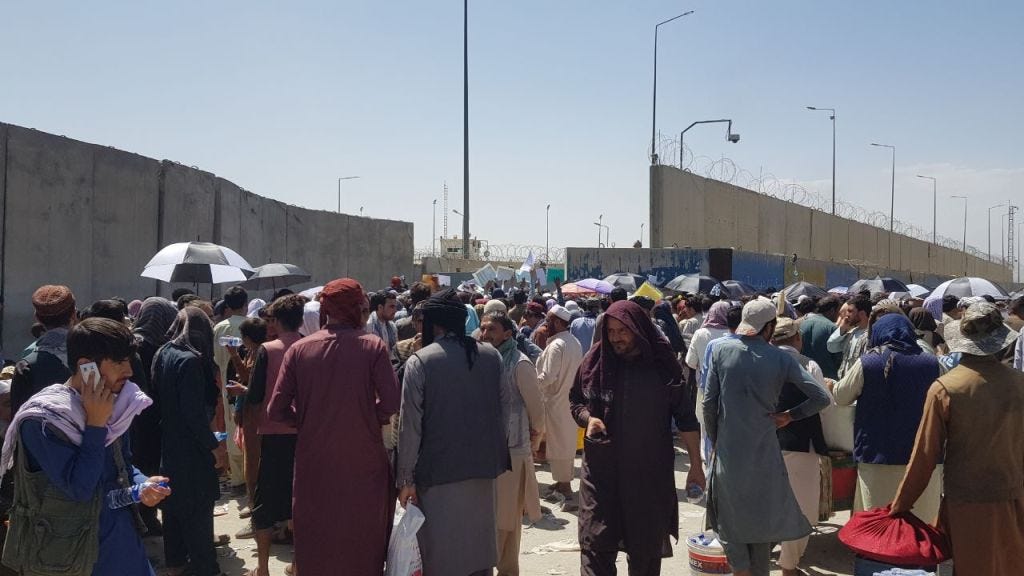During one of her many evacuation attempts between the fall of Kabul on August 15 and the American military retreat on August 31—“Don’t ask about the dates, because I have no idea”—Ellaha, a U.S. green card holder, plunged into a crowd of thousands of refugees in a last-ditch effort to reach Hamid Karzai International Airport along with her elderly mother.
“Suddenly this mob was squeezing us and pushing us,” Ellaha, who asked that her surname be withheld, told The Dispatch. “That’s why when these kids are being separated, I totally understand what sort of trauma they have gone through and experienced, because my mom and I, as adults, we couldn’t bear that mob—how panicked they were, how traumatized. Everyone was so scared and afraid and just wanted to get out of Kabul.”
The pair never reached the airport gates. Ellaha’s mother, who suffers from a heart condition, could not withstand the chaos surrounding Afghanistan’s last exit route. Ellaha recalled being pushed, kicked, and trampled by desperate evacuees before abandoning any hope of reaching the airport on foot. In the days that followed, Ellaha made the impossible decision to flee her home country alone to advocate for her mother’s rescue from afar.
U.S.-designated handlers transported Ellaha to the safety of Kabul’s airstrip just hours before an Islamic State suicide bombing killed 13 U.S. servicemembers and at least 170 Afghan civilians, suspending the military’s evacuation. The impromptu two-week mission, which President Joe Biden hailed as an “extraordinary success” upon its abrupt conclusion, left behind “hundreds” of Americans, many more U.S. permanent residents, and hundreds of thousands of at-risk Afghans.
Scores of those deserted belong to the populations particularly vulnerable in Taliban-occupied Afghanistan, given the “survival of the fittest” evacuation’s blind spot for the elderly, disabled, and infirm. Others are uniquely imperiled as members of ethnic and religious groups historically targeted by Taliban fundamentalism.
Many of the evacuees who finally broke through had no affiliation with the United States or international organizations, several sources told The Dispatch. Meanwhile, many of the Afghans who fought and worked alongside U.S. troops for two decades remain stranded, along with their family members.
When Shinwari took a position with the U.S. Special Forces in 2008, he saw the work as an opportunity to reconstruct Afghanistan for the better in the aftermath of Taliban rule. Short of that, he thought his service might afford his family security in exchange for much needed Afghan assistance.
“They needed help,” said Shinwari, who requested to be identified by his surname. “Because they were new to this country and they didn’t know the culture or the language.”
“I’ve seen a lot of bad situations. I’ve been blown up two times—one of our trucks that was going out on a mission was hit by an IED, so I have a back injury,” he added. “And one time in our base, seven suicide bombers came to our camp and just blew themselves up. In my mind, I have still that explosion.”
In total, Shinwari was deployed with U.S. forces for more than six years. He and his two sons qualified for U.S. citizenship in 2019, and his wife, also Afghan-born, is a green card holder. But when the Taliban swept Afghanistan earlier this year, swallowing provincial capitals in rapid succession, Shinwari’s connections up the ranks of the U.S. military lent his family little favor as thousands scrambled to evacuate at once.
After narrowly evading several Taliban checkpoints, Shinwari’s wife, two sons—one of whom suffers frequent seizures—and diabetic mother queued outside of the airport for nearly 15 hours overnight. “My sick mom and my sick son were just sleeping on the ground, and there’s nothing. There is no food, no water, nothing,” Shinwari, who had come to the U.S. a year earlier, told The Dispatch. When his family finally reached the airport’s bottlenecked entrance, guards turned away Shinwari’s mother, even with a personal letter from his Army unit and her immigration case number.
“They told my wife and two sons: ‘If you want to go inside, go. If not, give us your passport and green card and go home.’ And I was really mad—this is my reward for my service? They’re U.S. citizens, they’re not illegal or undocumented,” he said, exasperated. “Why are you guys doing this to her?”
Ten minutes after Shinwari’s wife and children passed through the airport gates, a suicide bombing took place among the crowds outside. His mother miraculously avoided the blast, but remains stranded in the country, alone, in deteriorating health.
“My kids are already missing their grandmother. My son, when he wakes up in the morning, he says ‘where’s grandmother? I want to go to her,’” Shinwari said. “I’m worried about my son, because he’s six and a half years and has a speech delay and walking problems. I saw improvement with my son when he was with my mother, because she tried to help him talk and try to walk. She treats my son like her own son.”
During the Taliban’s first stint in governance between 1996 and 2001, religious and ethnic minorities became the designated enemies of its particular brand of Islam. In 1998, the group went on a “killing frenzy,” indiscriminately firing on civilians and soldiers alike in the city of Mazar-i-Sharif. In the days following, Taliban officials went door-to-door, executing men and boys and raping women and girls. Both campaigns targeted Hazaras, Afghanistan’s third-largest ethnic group and followers of Shiite Islam.
Not much is expected to change this time around. During its 20 year insurgency, the Taliban focused its operations against Afghanistan’s civilian population on ethnic Hazaras and other religious minorities. In early July, the group reportedly killed and tortured nine Hazara men after capturing the Ghazni province. Last month, fighters destroyed a statue of Abdul Ali Mazari, a Hazara leader whom the Taliban murdered in 1995.
In a Taliban-controlled Kabul, the Hazaras are once again “first targets” of the new government, said a Hazara man who spoke to The Dispatch on the condition of anonymity. “One of my neighbors, who was a young kid of 13 or 14 years, was shot down in front of everybody in the street,” he said. “Just in front of my house.”
“I received another call today,” he added on Sunday night. “They shot down two other kids, about 12 or 13 years old. They were playing on the street, they had been doing nothing else.”
The man, who is now based in Paris with his wife and children, served alongside U.S. forces for more than four years but never secured a visa. His stranded brothers, sisters, and father-in-law all worked for the Afghan government, military, or international organizations in some capacity, rendering them uniquely at-risk and eligible for Priority 1 and 2 designations. The paperwork is currently underway.
In the meantime, the families have moved locations in an effort to evade Taliban detection, but fear they’re among the many forgotten in the confusion of the U.S.’s hasty withdrawal from Afghanistan.
“We have contacted my previous U.S. friends, people who I worked with, but unfortunately, for the moment there is no answer,” he said. “I feel that we are left behind.”
In the aftermath of the botched evacuation, Ellaha said, “it’s not about disappointment, but it’s about asking questions.”
“I wouldn’t push my mother further, because I was on the brink of losing her in all those attempts. There’s hundreds more people who are not well, they are disabled, what was the plan?” she added. “So many of my friends’ parents and sisters and brothers who are disabled have encountered similar situations. They haven’t been able to evacuate because of this process.”
In all, Ellaha’s voyage back to her husband and children in the United States took more than five days. Her only solace was the kindness of the U.S. servicemembers who helped her along the way. “I’m so thankful,” Ellaha said. “The way they treated us, honestly, I cannot really express my appreciation.”
But cramped living conditions, poor sanitation, and bed shortages left her physically and emotionally drained upon her arrival home.
“I was about to cry. I was so internally hurt. I couldn’t sleep, I couldn’t eat anything. There wasn’t any proper place to sleep, so how would you put someone who’s already so sick in those sort of camps? I don’t know how many people lost their lives or how many people are now sick from this process,” Ellaha said. “Even if it may take longer, work on something more proper, correct, in a way that won’t hurt people.”







Please note that we at The Dispatch hold ourselves, our work, and our commenters to a higher standard than other places on the internet. We welcome comments that foster genuine debate or discussion—including comments critical of us or our work—but responses that include ad hominem attacks on fellow Dispatch members or are intended to stoke fear and anger may be moderated.
With your membership, you only have the ability to comment on The Morning Dispatch articles. Consider upgrading to join the conversation everywhere.